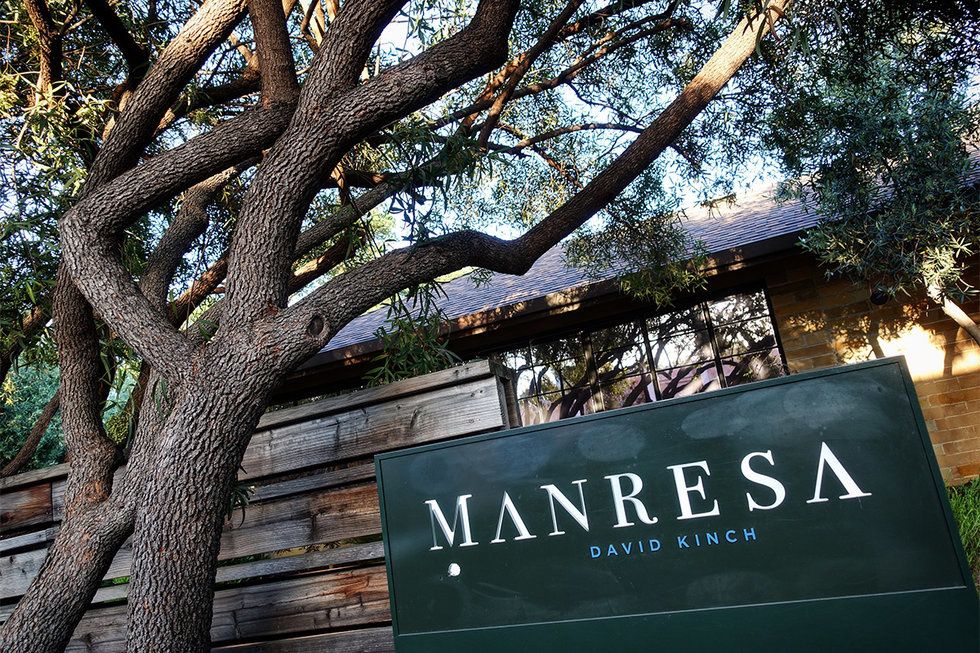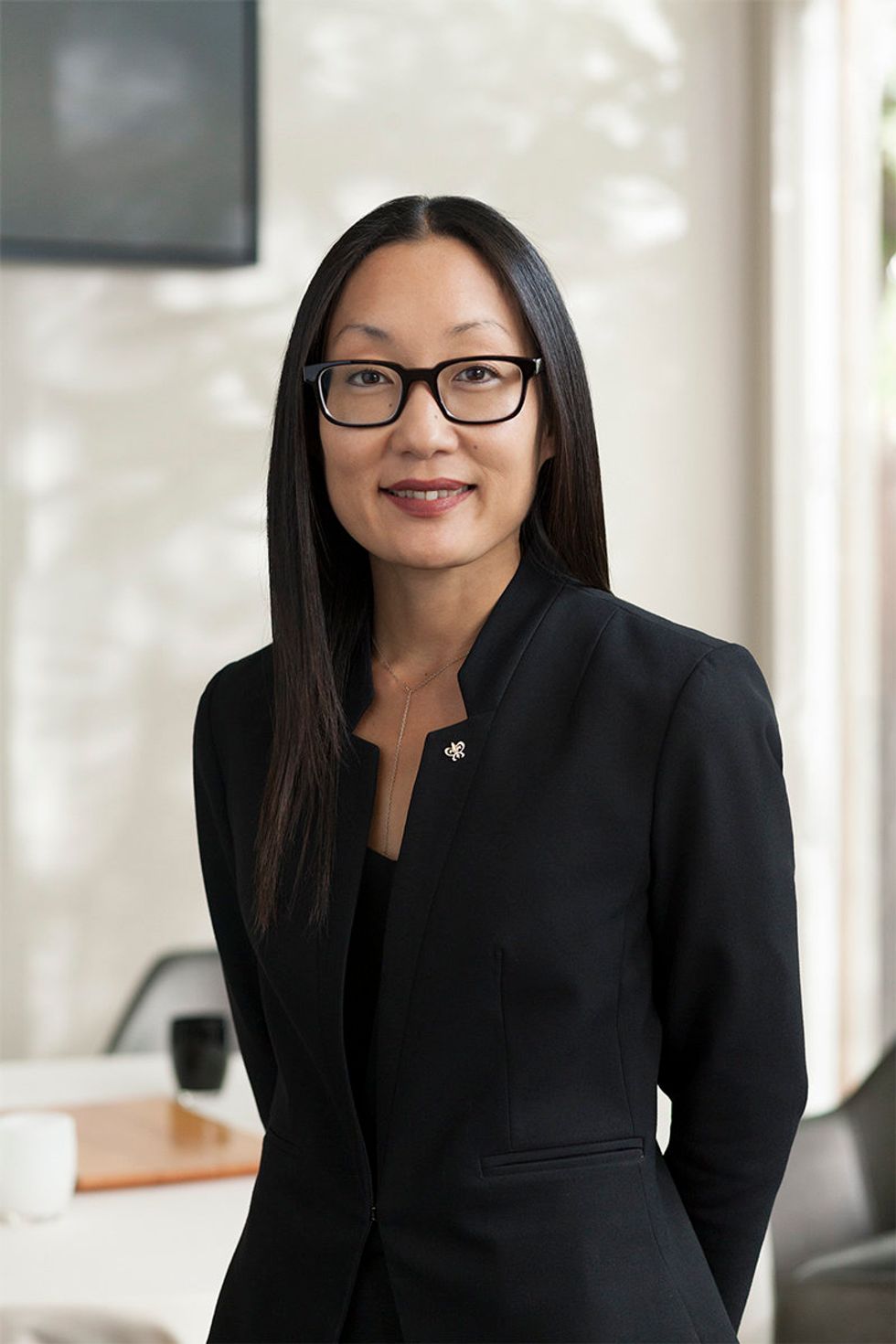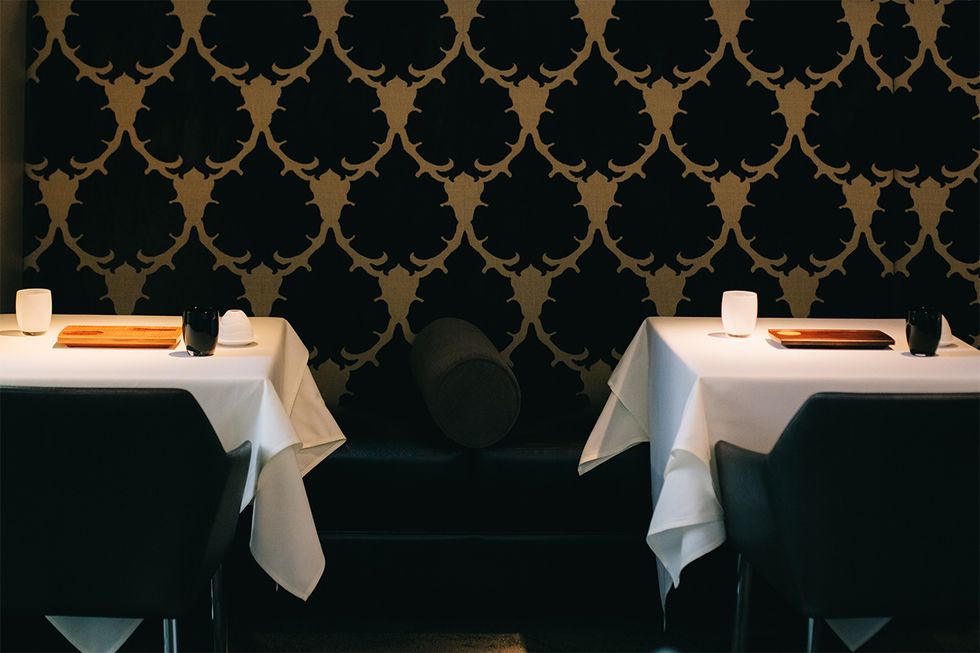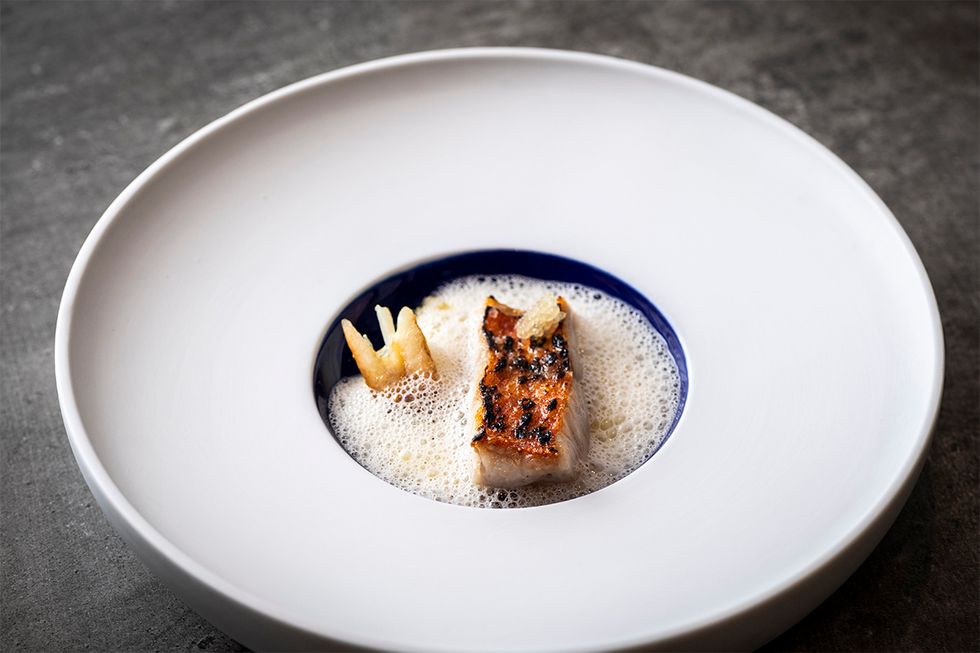On an evening in June, I was midway through dinner at the three-Michelin-starred Los Gatos restaurant, Manresa, and I was having a moment. The dish in question was called Into the Vegetable Garden. Conceived by Manresa's executive chef and proprietor, David Kinch, it resembled a polychromatic sculpture in miniature. The course is a standard on the menu, and on any given night consists of 35 to 40 different diminutive leafy greens, punctuated by the vibrant hues of tiny flowers. Among the greens, there were some fava beans, and shaved kohlrabi as well, but what really got me were the fermented spruce tips, whose taste took me straightaway to the depths of a pine forest—cool and primordial and somehow Nordic.
Meanwhile, a different kind of moment was transpiring in a corner of the dining room, where Manresa's sommelier, Jon Walker, was pouring a wine pairing for a guest. As Walker saw to the task, Manresa's wine director, Jim Rollston, materialized silently nearby, where, back to the wall, he made use of a few ticks of the second hand by quickly scanning the tables. The moment Walker finished the pour, wiping the neck with a black cloth, he pivoted, wordlessly passing the bottle—a 1996 Château Calon Ségur—to Rollston, who set off across the room at a determined yet unrushed pace.

As handoffs go, it was virtuosic, but no one at Manresa appeared to notice, at least not the couple going into a trance over the sea urchin bavarois, or the party of six biting simultaneously into their red pepper-black olive petits fours. On Manresa's team, however, a singularly perspicacious woman in a black suit and black-framed glasses was quietly watching every move.
The woman in black, Jenny Yun, is Manresa's general manager, a title whose vagueness encompasses accountability for virtually all of a restaurant's operations, with the exception of preparing food.
"It's the GM's responsibility to know anything and everything that pertains to the restaurant," said Yun, "what's happening in the restaurant, what's happening to the building, what's happening to the team members, the financial aspects, how to spend and when to spend, how many pieces of silverware there are, how many glasses were broken. You name it, we have to know it."
A Bay Area native, Yun found her way to the profession somewhat by accident, when the financial realities of working as an intern at a New York fashion magazine led to a job at a coffee shop in Brooklyn. From there, she hopscotched to a small restaurant called the Kitchen Club, to Brooklyn's River Café, and then to Thomas Keller's Per Se, where as a concierge, she tended to the business of VIP guest relations. In 2013, Yun returned to California, holding positions at The Restaurant at Meadowood and elsewhere before joining Manresa in 2015. While Yun doesn't take credit for the fact that Manresa attained its third Michelin star in 2016, her bio discreetly notes that under her leadership, the restaurant attained three stars in 2017 and 2018.
Much of Yun's work, the administrative aspect of it at any rate, goes on out of the public eye, in the first of what she calls her "two banker's shifts." Where guests experience Yun's talents most directly is during her second shift, when five nights a week, between the hours of 5:15pm and 12:30am, she and her front-of-house team of 12 execute the complex and intricately choreographed production of Manresa's service. Somewhat paradoxically, the closer Yun and her team get to perfection, the more invisible their achievement becomes.
Consider a water glass. If you empty it, and it stays empty, it's all you can think about. But say you've developed a liking for Manresa's sparkling water—bottled at the source in a glacial valley in Wales—and are sipping it diligently with an eye toward balancing out the 2017 Vincent Gaudry Sancerre "Tournebride," the 2016 Puligny-Montrachet before it, and the 2007 Hugues Godmé Extra Brut Blanc De Noirs before that. If your waiter knows—and this is not hypothetical—precisely when to glide by and top you up in such a way that interrupts neither the conversation with your friend, nor your communion with your charcoal-grilled kinmedai finished with garlic butter and homemade fish sauce, the act barely registers on your radar.
On a fundamental level, unobtrusiveness comes down to motion, from the way the staff traverses the dining room to the way they set down and take away the plates, silver, and stemware. While Yun inherited a certain system of service when Kinch hired her, in the years since, she has made it her own.

"The restaurant is 17 years old," said Kinch, "and had a series of GMs over the years. Michael Kean, who was here from 2004 to 2011, synchronized everything. He had been a professional dancer in another life. He made the staff do certain things, made the staff walk with their right hand behind their back, and forced everybody to recognize their gait. When Jenny stepped in, she refined the system and incorporated her own taste."
Savoring a pleasingly salty Capital oyster—cleverly sandwiched between layers of fermented black truffle, braised leeks, sorrel leaves and razor-thin slivers of raw asparagus marinated in koji oil—I glanced about the dining room, where the flow of service resembled nothing so much as the flow of a stream—waiters circulating around tables like water eddying around so many white-tableclothed rocks. The moment a server enters the dining room, the fluidity of their course gives the sense that they've visualized the entire mission in advance, down to their exit and return to the kitchen. In between, the moves at the tables are graceful and swift, a six-top cleared and set as quickly as a table of four, or two. If it all seems to be following the rhythm of some internal clock, that's not far off the mark.
"Short of bringing in a metronome," Yun explained, "which I did once to show the fastest speed at which everyone was to walk, the rule of thumb is that if you are the fastest person moving in the dining room, you're walking too fast. There are pathways that we follow," she continued, "and basic rules of presence in the dining room. There is a protocol for each piece of silver, there is a point of entry for each table, there is a 'drop' sequence and a 'clear' sequence. There are also situations where the synchronization needs to be broken and the whys of those situations are different."
The whys, in this instance, are the variables that aren't under Yun's control: Manresa's guests.
"There is this understanding that at this level you always do things in a certain way," said Yun. "You always serve from the left, you always clear from the right, and you mark tables a certain way. But the guest doesn't know that. Just because you're supposed to do something a certain way doesn't mean it's right for the guest. We're supposed to drop food in a certain way, but if a guest has shifted, you have to divert. It's moments like that where it's not about us. We have a protocol, and protocols need to be broken when the guest needs them to be."
A similar flexibility and a keen sensitivity come into play when it comes to engaging with guests beyond a recitation of the details of a dish. Yun, who spends a lot of time thinking about time and how to optimize it, considers the matter of engagement through a temporal as well as a psychological lens.
"Some nights it's very quiet," she said, "Some nights are extremely boisterous. Obviously, on a calm, quiet night, time seemingly moves very differently than on a boisterous night. The time it takes for the food to be prepared is exactly the same, but the guest's perception of time can be very different depending on what the guest is up to. I think timing is something that's very important to the guest whether they know it or not. I think it can be a very conscious or subconscious thing."
"If we're dining," she continued, "and not having a good conversation, two minutes may seem like 10 minutes. If it's a good conversation, two minutes may seem like 20 seconds." Depending on the situation, Yun said, "we either try to not engage because it can be interrupting or, if guests seem out of their element, to engage them to make them feel more at home."
While I was on my own that night, I wasn't feeling particularly out of place. I was, however, curious about a photograph hanging nearby, an image of an ocean wave, dark, rippling, and mysterious. Knowing that Kinch was a surfer, and that the artwork on the walls was his, I wondered about the provenance. And although I kept my curiosity to myself, after presenting the fourth course—aori-ika, an especially delicious squid from Japan, whose dense chewiness was wonderfully complemented by the toasty crispness of puffed California wild rice and elusively soft beads of tapioca rehydrated in a savory shellfish jus—the waiter volunteered, as if from the blue, that the brooding wave was the work of Patrick Trefz, a director and photographer from Santa Cruz who is a friend of Kinch.
Was it clairvoyance? Perhaps. Clairvoyance, though, is really just another word for the kind of heightened awareness that's the key to this seamless operation. "Everyone is always observing," said Yun. "Obviously it is sometimes easier for myself or the assistant GM to observe because it's our responsibility to look at everything. The captains observe what's happening at their stations, the back servers observe in the dining room, and they all try to communicate with each other. There's constant communication about what needs to get done."
If the communication between Manresa's staff seems telepathic, it is not. It is merely non-verbal. "Those who work predominantly on the floor," Yun explained, "can all assess a room and see what needs to get done. We hope that our priorities are aligned with one another, and since we know what needs to get done, all we need to do is make eye contact." The upshot of which is that when your servers aren't actively tending to your needs, they're not just nearly invisible, but inaudible as well, the resulting absence of distraction allowing you to focus on the matter of taste, whether of braised, fire-roasted abalone garnished with porcini, shaved red walnut, chives and abalone XO sauce, or the complex deliciousness of a cut of California ribeye, dry-aged on the order of 120 days, its flavors reminiscent of wild forest mushrooms and wondrously strong cheese.
The latter was served by Kinch himself, who emerges periodically from the kitchen to greet his guests. It is Yun, however, who is the constant presence, as deeply enmeshed in service as any of her crew. "It is very important to me," she said, "to be in service with them every night from the beginning to nearly the end, because I don't believe you can make changes to things that you are not a part of, physically." Which is why, five nights a week, in the second of her two banker's shifts, you will find Yun completely in her element, silently setting a wineglass spot on target, spiriting away an empty plate, or folding a vacated tablecloth with the care and precision worthy of a nation's flag.
// Manresa, 320 Village Ln. (Los Gatos), manresarestaurant.com
























